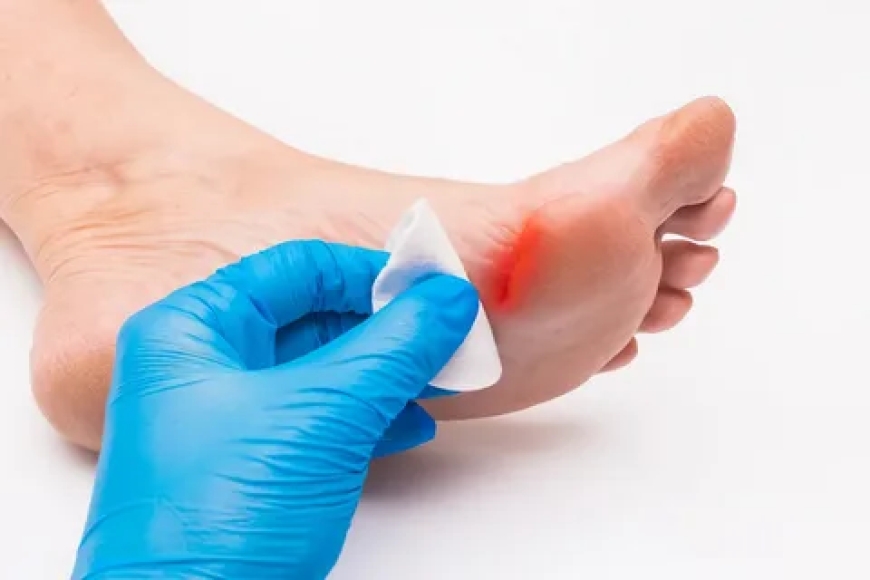Podiatry Advice for Diabetic Foot Self-Care in Edinburgh
Protect your feet with expert diabetic foot care tips. Get trusted podiatry advice from top professionals in Edinburgh.

Managing foot health holds critical importance for individuals with diabetes. Tiny cuts and blisters have the potential to develop into major health issues. The necessity of daily foot care demands your unwavering attention and commitment. Through expert guidance combined with routine examinations, individuals can prevent infections and painful conditions while reducing the need for hospital visits. The pursuit of comfort becomes secondary to the essential goals of maintaining health and ensuring safety.
People with diabetes may be unable to feel pain or injury in their feet due to impaired blood flow or damage to the nerves. Regular management and support is essential for good diabetic foot care. A reputable Podiatry Clinic in Edinburgh can help manage your foot care with a suitable professional and acceptable treatment plan. They have a staff who are knowledgeable about diabetic foot complications and management decisions.
This blog will guide you through simple and helpful tips to keep your feet safe and healthy. You will learn how to care for your feet daily and know when to ask for help. Let’s begin with these five key areas:
-
Daily Foot Checks Matter
-
Keep Feet Clean & Dry
-
Choose Shoes with Care
-
Watch for Skin Changes
-
Consult Podiatry Experts
Daily Foot Checks Matter
Making it a habit to check your feet every day is an easy way to protect yourself from serious complications. You should check for signs of cuts, blisters, swelling, or red spots. If you have trouble checking the bottoms of your feet, consider using a mirror or asking someone else to help if you can. If you find anything at all, take action promptly. The sooner you address a complication means a better chance of recovery without worsening complications. For individuals with diabetes, small cuts and injuries may not heal quickly and also have a greater risk of infection. That is why checking your feet daily is so important. Even if your feet feel fine, do not skip checking them. The idea of checking your feet each day is to keep you informed and taking action if something is discovered. If you don't know what you are looking for, you could consider stopping in to see a podiatrist. Seeing a podiatrist allows you the opportunity to be informed of what to look for and to receive professional guidance on healthy feet.
Keep Feet Clean & Dry
Clean feet are healthy feet. Washing your feet every day with warm water and mild soap helps remove dirt and germs. But don’t soak them too long, as this can dry the skin. After washing, dry your feet well—especially between the toes. Moisture between toes can lead to fungal infections. Keeping your feet dry also helps prevent skin from breaking or peeling. Use a soft towel and pat gently. Once your feet are dry, apply a little moisturizer to the tops and bottoms. But don’t use lotion between your toes. For the best results, follow these steps every day. If you have trouble reaching your feet, ask someone for help. A trusted Podiatry Clinic in Edinburgh can also guide you on the best products to use. They understand diabetic foot care and offer simple tips that work. So, remember—clean and dry feet are the first step to healthy living.
Choose Shoes with Care
If you have diabetes, it's very important to wear the correct shoes. Shoes that don't fit right can lead to blisters, pressure points, and ulcers. You should always wear well-fitting shoes that provide support. Make sure you do not wear shoes that are too tight or have hard seams inside. Also, check to see if there is anything that could potentially injure your feet inside your shoes. Things like small objects such as stones or rough edges can hurt the inside of your feet without you actually feeling it. Look for shoes especially made for people who have diabetes. They usually have a soft slip-on interior with a wide toe area. If you are not near a diabetic shoe store to choose shoes from, consider going to a podiatrist for direction. Good shoes protect your feet from damage and help you stay active.
Watch for Skin Changes
Even small skin changes on your feet can be signs of bigger problems. Look for dry skin, cracks, redness, swelling, or changes in color. These signs may mean poor blood flow or early infection. Pay close attention to areas like the heels and between the toes. If the skin feels too hot or cold, that can also be a sign of an issue. Don’t ignore peeling or flaking skin, as this could lead to sores. If anything looks odd or doesn’t go away in a few days, contact a Podiatry Clinic in Edinburgh. The experts there can check your feet and offer safe treatment. It’s always better to act early than wait for pain or infection. Healthy skin keeps your feet strong and safe. So, check your skin daily and note anything that looks different. Being aware today can protect your health tomorrow.
Consult Podiatry Experts
Even if your feet look and feel healthy, you should have regular visits with a podiatrist. Regular podiatrist visits will help find small problems before they become big problems. A podiatrist can perform a nail cut safely, treat dry skin, check your circulation, address "notching" in your toenails, and give specific advice for diabetic foot care. When you're unsure about a cut, blister, blister, or pain of any kind, don't wait for the condition to worsen. Expert treatment is just a phone call away. A trusted Podiatry Clinic in Edinburgh can give you the help and support you need. Their team knows how to treat and prevent diabetic foot issues. With regular visits, you gain peace of mind and better health. You don’t have to manage everything alone. Experts are here to help you every step of the way.
Conclusion
In short, diabetic foot care starts with daily habits and expert support. Small steps like checking your feet, wearing safe shoes, and keeping them clean can prevent serious problems. But don’t stop there. Regular help from a Podiatry Clinic in Edinburgh gives you the best chance at long-term foot health. Always listen to your body and take action early. With the right care, your feet will carry you forward safely and confidently.




































































